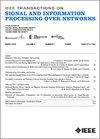Robust Diffusion Recursive Algorithm for Distributed Widely-Linear Exponential Functional Link Network
IF 3
3区 计算机科学
Q2 ENGINEERING, ELECTRICAL & ELECTRONIC
IEEE Transactions on Signal and Information Processing over Networks
Pub Date : 2025-07-18
DOI:10.1109/TSIPN.2025.3589685
引用次数: 0
Abstract
Distributed adaptive filtering has emerged as a critical methodology across diverse application domains, including wireless sensor networks, distributed signal processing, and intelligent control systems. However, existing diffusion-based adaptive filters suffer performance degradation in non-Gaussian noise and complex network topologies, leading to sub-optimal operation and instability risks. These limitations motivate the development of a robust framework that maintains distributed processing advantages while improving noise robustness. To address this, we propose a distributed widely-linear exponential functional link network (D-WLEFLN) combining wide-linear architecture with exponential expansions for enhanced nonlinear modeling. Furthermore, we develop a kernel risk Blake- Zisserman (KRBZ) based cost function to achieve enhanced outlier resilience. Building upon this foundation, a diffusion recursive kernel risk Blake-Zisserman (D-RKRBZ) algorithm is developed through recursive optimization, alongside a computationally efficient variant specifically designed for the WL architecture to maintain operational efficiency while preserving estimation accuracy. We provide theoretical analysis for the proposed algorithm, encompassing both mean stability and mean square performance. Simulation results validate that the performance of the proposed D-RKRBZ algorithm closely aligns with theoretical analysis. Comparative evaluations against existing diffusion counterparts reveal that D-RKRBZ can achieve lower mean square deviation (MSD) in complex-valued non-Gaussian environments, including contaminated Gaussian (CG) noise and分布广义线性指数泛函链路网络的鲁棒扩散递归算法
分布式自适应滤波已成为跨各种应用领域的关键方法,包括无线传感器网络、分布式信号处理和智能控制系统。然而,现有的基于扩散的自适应滤波器在非高斯噪声和复杂网络拓扑中存在性能下降,导致次优运行和不稳定风险。这些限制促使开发健壮的框架,在保持分布式处理优势的同时提高噪声健壮性。为了解决这个问题,我们提出了一种分布式宽线性指数函数链接网络(D-WLEFLN),将宽线性结构与指数展开相结合,以增强非线性建模。此外,我们开发了一个核风险布莱克-齐瑟曼(KRBZ)为基础的成本函数,以实现增强的离群弹性。在此基础上,通过递归优化开发了扩散递归核风险Blake-Zisserman (D-RKRBZ)算法,以及专门为WL架构设计的计算效率变体,以保持操作效率,同时保持估计准确性。我们对所提出的算法进行了理论分析,包括平均稳定性和均方性能。仿真结果验证了D-RKRBZ算法的性能与理论分析基本一致。与现有扩散算法的对比表明,D-RKRBZ在复值非高斯环境下(包括高斯污染(CG)噪声和$\alpha $稳定噪声)可以实现较低的均方偏差(MSD)。
本文章由计算机程序翻译,如有差异,请以英文原文为准。
求助全文
约1分钟内获得全文
求助全文
来源期刊

IEEE Transactions on Signal and Information Processing over Networks
Computer Science-Computer Networks and Communications
CiteScore
5.80
自引率
12.50%
发文量
56
期刊介绍:
The IEEE Transactions on Signal and Information Processing over Networks publishes high-quality papers that extend the classical notions of processing of signals defined over vector spaces (e.g. time and space) to processing of signals and information (data) defined over networks, potentially dynamically varying. In signal processing over networks, the topology of the network may define structural relationships in the data, or may constrain processing of the data. Topics include distributed algorithms for filtering, detection, estimation, adaptation and learning, model selection, data fusion, and diffusion or evolution of information over such networks, and applications of distributed signal processing.
 求助内容:
求助内容: 应助结果提醒方式:
应助结果提醒方式:


